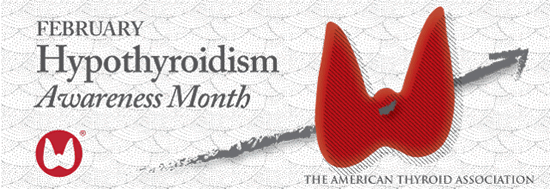
Clinical Thyroidology for the Public summarizes selected research studies discussed in the previous month’s issue of Clinical Thyroidology, an official publication of the American Thyroid Association. Editor-in-chief, Alan Farwell, MD, FACE
Volume 17 Issue 2
Available in pdf format for saving and printing and Web page format for viewing online
PDF Format for Saving and Printing
Clinical Thyroidology for the Public Volume 17 Issue 2 (PDF file, 2.68 MB)
TABLE OF CONTENTS – Web Format
THYROID FUNCTION
What is normal thyroid function in children with Down syndrome?
Children with Down syndrome (DS) are at increased risk of having thyroid problems. Mild hypothyroidism can be seen up to 60% of children with DS. However, it is difficult to understand the thyroid function in children with DS because we do not have clear rules for what’s normal. The researchers planned this study to figure out the normal ranges for TSH, free T3 and free T4 in children with DS at different ages.
Cattoni A et al 2023 Thyroid function tests in children and adolescents with trisomy 21: Definition of syndrome-specific reference ranges. J Clin Endocrinol Metab. Epub 2023 Jun 3. PMID: 37279507.
THYROID FUNCTION TESTS
The “new normal” for thyroid function test ranges.
The normal range of thyroid function tests is determined by measuring Free T4 and TSH levels in a population of healthy adults with no thyroid problems. Those results in the middle 95% are considered the normal range; the 2.5% above these levels and the 2.5% below these levels are considered abnormal. This study was done to see if the normal range of thyroid function tests needs to be adjusted to better reflect patients’ risk of heart disease and death.
Xu Y et al Thyroid Studies Collaboration 2023 The optimal healthy ranges of thyroid function defined by the risk of cardiovascular disease and mortality: Systematic review and individual participant data meta-analysis. Lancet Diabetes Endocrinol 11:743–754. PMID: 37696273.
HYPERTHYROIDISM
Long term outcomes of patients with Graves’ Disease
Graves’ disease is the most common cause of hyperthyroidism in the United States. Unfortunately, the long-term behavior of Graves’ disease remains unknown. This study examines the clinical outcomes of individuals with Graves’ disease more than 20 years after their initial diagnosis and treatment. The researchers explore the progression of the disease, the impact on quality of life, and factors that influence the likelihood of disease remission or relapse.
Meling Stokland AE et al Outcomes of patients with Graves disease 25 years after initiating antithyroid drug therapy. 2023 J Clin Endocrinol Metab. Epub 2023 Sep 25. PMID: 37747433.
THYROID CANCER
Is there a role for levothyroxine therapy in active surveillance of papillary thyroid microcarcinomas?
Papillary thyroid microcarcinomas can often be monitored without the need for surgery or other treatment (active surveillance). We know that in some patients, the small cancers will grow and surgery may eventually be needed. The current investigators looked back at their extensive experience in patients with papillary thyroid microcarcinomas undergoing active surveillance to evaluate the effect of levothyroxine therapy to decrease TSH levels to see how this influenced cancer growth.
Yamamoto M et al 2023 Active surveillance outcomes of patients with low-risk papillary thyroid microcarcinoma according to levothyroxine treatment status. Thyroid 33:1182–1189. PMID: 37310904.
THYROID CANCER
Small medullary thyroid cancer: predictive factors and outcomes
Medullary thyroid cancer (MTC) is a relatively rare form of thyroid cancer. The goal of this study was to determine the factors that help predict outcomes in small medullary thyroid cancers, also known as medullary microcarcinomas (<1 cm), as there studies that suggest they may have very different outcomes than larger cancers.
Kesby N et al. Natural history and predictive factors of outcome in medullary thyroid microcarcinoma. J Clin Endocrinol Metab 108:2626–2634. PMID: 36964913
THYROID CANCER
Prognostic factors for anaplastic thyroid cancer
Anaplastic thyroid carcinoma (ATC) is a very rare and aggressive type of thyroid cancer with a poor prognosis. Prior studies have reported several factors that can affect the prognosis of ATC patients. The goal of this study was to evaluate prognostic factors in a large group of patients with ATC from a care center network in France.
Jannin, A et al ENDOCAN-TUTHYREF Network 2023 Factors associated with survival in anaplastic thyroid carcinoma: A multi-center study from the ENDOCANTUTHYREF Network. Thyroid 33:1190–1200. PMID: 37855745



